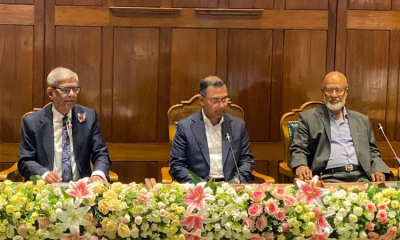A whole of society policy approach holds the key for Bangladesh to overcome considerable challenges facing the country right from its birth in 1971, as the development journey for the youngest nation in South Asia has been a “collective effort”.
Radwan Mujib Siddiq makes the observation in his editorial note, titled “Leave no sector behind,” in the latest edition of the first policy magazine in Bangladesh, WhiteBoard.
“The government, business, and civil society have all contributed to the policymaking process. This participatory approach has led to an impressive vision for the country,” writes Radwan, a London School of Economics graduate.
“A participatory approach to development has served Bangladesh well. A diverse set of inputs has helped widen the vision of policymakers,” reads the note from editor-in-chief of the magazine, Radwan, who is also a strategy consultant and youth advocate.
Radwan, a trustee of the Center for Research and Information (CRI), also stresses on “policy scrutiny” as more crucial than ever in the country’s pursuit of becoming an advanced economy.
Reiterating stance for welcoming new ideas, Radwan writes, “At WhiteBoard, we will continue to contribute to this process by providing an open space for new ideas. Wildlife protection, community tourism, and green finance are all featured in this issue of WhiteBoard, as we look to go beyond the headlines to widen the policy debate.”
The latest issue features a host of critical issues from top relevant experts with a critical and empirical analysis containing the way forward to address challenges that lie ahead, in sync with 21st-century challenges.
Conservationist and programme coordinator for the International Criminal Investigative Training Assistance Program (ICITAP), Nasir Uddin; Senior Law Enforcement Advisor with ICITAP, Craig Fullstone; and programme coordinator for ICITAP, Samia Saif, shed light on the intensity of wildlife crime in Bangladesh.
Citing wildlife trafficking to be on the rise, and the country’s legal framework not providing enough of a deterrent, their recommendations include new laws, community awareness, and an empowered Wildlife Crime Control Unit.
In the article, “Trade and industry in 21st century Bangladesh”, Zaidi Sattar, Chair of the Policy Research Institute of Bangladesh, put up a comparative analysis on core components of the country’s economy — workers, farmers and entrepreneurs — with recommendations to equip the country for the challenges ahead. “Rising female labour force participation in the coming decade could add a few percentage points to Bangladesh’s economic growth,” he observes.
In her take on the country’s drive for universal health coverage, Maliha Mannan, an entrepreneur and a public health communicator, says that Bangladesh’s goal to achieve it by 2030 will require intensifying primary healthcare (PHC) services and expanding health insurance schemes. Ideally, PHC should cover 80–90% of an individual’s healthcare needs, and insurance should reduce the burden of out-of-pocket expenses.
In light of future potentials and challenges, why it is high time for Bangladesh to expand the application of renewable energy across sectors and how it can be addressed come up in a joint piece by Shahriar Ahmed Chowdhury, who is a founder of the Centre for Energy Research at United International University, and Waseqa Ayesha Khan, a member of the parliament in Bangladesh and Chair of the Parliamentary Committee on the Ministry of Power, Energy and Mineral Resources.
A Professor Emeritus of International Development at the University of Bath, Geof Wood, and Professor Sattar Mandal jointly authored a piece on “the new challenges for agrarian Bangladesh”.












-20260217073221.webp)




-20260216115008.webp)














